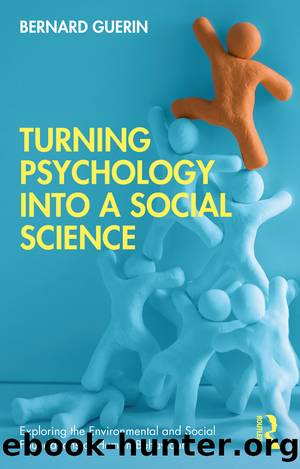Turning Psychology into a Social Science by Guerin Bernard;

Author:Guerin, Bernard;
Language: eng
Format: epub
Publisher: Taylor & Francis Group
Published: 2020-06-15T00:00:00+00:00
Examples of language use (stating beliefs) and how this engenders resources
I will say all of what I have said in V4.3, but in a different way and using the language form we call âbeliefsâ as my example. The social contextual approach to language use is that is it just a learned behaviour (but a complex one with heaps of training) shaped to do things to people. The different forms of language do different things to people or else do them differently. There is nothing more inherent to language than this, and the material basis of language is just a combination of (1) the extensive training we have and (2) the effects we get from other people with the different forms. There is no added meaning, symbolism, expression, communication, representation, or reference to things involved. For the case of âstating our beliefsâ, this means that we do not âhave beliefsâ or âpossess beliefsâ, but that we use beliefs to accomplish our social behaviours.
We âdoâ social relationships for the resource outcomes, not in an exploitative way but in reciprocal relationships of various kinds. The crux of all human life is doing these resourceâsocial relationship pathways to get what we and our communities need. These pathways, however, have changed in the last 200â300 years of capitalism from having a small number of resource and obligation reciprocities within large families to having a large number of compartmentalized stranger or contractual relationships in which the parties do not have reciprocal relationships among themselves nor any further obligations beyond the contract.
In order to run our lives and get our resources we therefore need many social behaviours to initiate, facilitate, manage, maintain, and cease our social relationships. Again, these all have very different social properties for kin-based relationships and for stranger or contractual social relationships.
Beliefs therefore enter into our social relationships as do any other social behaviour: through competing, cooperating, bonding, bullying, image management, sharing, agreeing, distancing, reciprocating, hedging, protecting, complaining, controlling, conflicting, being polite, being rude, being humorous, inducing positive and negative emotions, showing off, humbling. You can observe human situations of all these different interactions in which the stating of beliefs is used instead of other social behaviours to have the same effect and to get the same resource outcomes.
For example, to bully someone, we might use some form of physical force, we might get others to gang up on them, or we can bully them with beliefs. Beliefs are just another social strategy for resourceâsocial relationship pathways. We can do both good and bad things to people with beliefs, and examples of both are given in the following list. Male perpetrators of domestic violence often bully their partners into agreeing with their âbeliefsâ about the world. This is done not to help the partner correctly portray the world, but to control all their behaviours (Guerin & Ortolan, 2017).
The following are some examples of how to do some of your social behaviours by stating beliefs:
â¢Competing: trying to get the other person to agree that your belief is âmore trueâ than theirs.
Download
This site does not store any files on its server. We only index and link to content provided by other sites. Please contact the content providers to delete copyright contents if any and email us, we'll remove relevant links or contents immediately.
| Administration & Medicine Economics | Allied Health Professions |
| Basic Sciences | Dentistry |
| History | Medical Informatics |
| Medicine | Nursing |
| Pharmacology | Psychology |
| Research | Veterinary Medicine |
Bioenergetica by Alexander Lowen(1122)
Noise: A Flaw in Human Judgment by Sunstein Cass R. & Sibony Olivier & Kahneman Daniel(968)
The Data Detective by Tim Harford(939)
The Child in You by Stefanie Stahl(882)
Chatter by Ethan Kross(797)
The Science of Rapid Skill Acquisition by Peter Hollins(636)
Freedom by Sebastian Junger(629)
No Bad Parts by Richard C. Schwartz(600)
The Montessori Baby by Simone Davies(561)
Evolution Gone Wrong: The Curious Reasons Why Our Bodies Work by Alex Bezzerides(559)
The Quantum Psychiatrist: From Zero to Zen Using Evidence-Based Solutions Beyond Medication and Therapy by Biswas Dona(551)
Maps of Meaning: The Architecture of Belief by Jordan B. Peterson(548)
The Science of Self-Learning: How to Teach Yourself Anything, Learn More in Less Time, and Direct Your Own Education (Learning how to Learn Book 1) by Peter Hollins(519)
Anxiety For Dummies by Charles H. Elliott & Laura L. Smith(511)
Sadomasochism and the BDSM Community in the United States by Stephen K. Stein(497)
Disconnected by thomas Kersting(480)
The Mechanics of Passions: Brain, Behaviour, and Society by Alain Ehrenberg(480)
Why Sex Doesn't Matter by Olivia Fane(479)
Jung - The Key Ideas: Teach Yourself (TY Philosophy) by Ruth Snowden(466)
